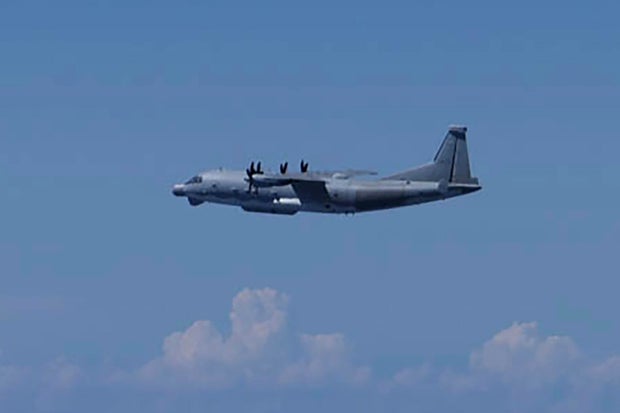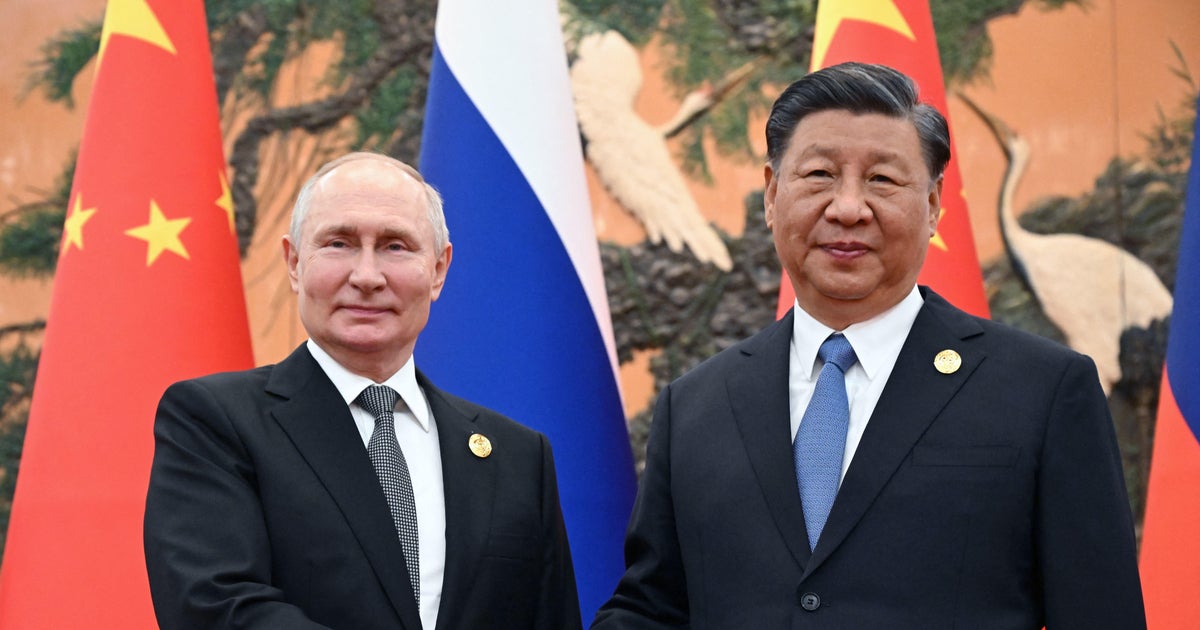CBS News
Japan says it scrambled fighter jets after Chinese spy plane violated its airspace

Japan said it scrambled fighter jets on Monday after a Chinese military aircraft violated its airspace in a further escalation of regional tensions. The incident comes just weeks after the U.S. military intercepted several Russian and Chinese bombers in international airspace near the coast of Alaska.
The two-minute incursion into Japanese airspace by the Y-9 surveillance aircraft at 11:29 a.m. was the first by a Chinese military plane, local media reported.
The aircraft “violated the territorial airspace off the Danjo Islands in Nagasaki Prefecture”, prompting Japan to deploy “fighter jets on an emergency basis”, Japan’s defense ministry said.
It said steps such as “issuing warnings” to the aircraft were taken. Broadcaster NHK reported that no weapons, such as flare guns, were used as an alert.
The defense ministry released a photograph of what it said was the plane.
/ AP
Deputy foreign minister Masataka Okano summoned China’s acting ambassador late on Monday and “lodged firm protest,” as well as calling for measures against a recurrence, the foreign ministry said in a statement.
The Chinese diplomat said in response that the matter would be reported to Beijing, according to the ministry. There was no immediate official comment from Beijing.
According to Japan’s military, it scrambled jets nearly 669 times between April 2023 and March 2024, about 70% of the time against Chinese military aircraft, though that did not include airspace violations.
Last month, two Russian Tu-95s and two Chinese H-6s entered the Alaska Air Defense Identification Zone, NORAD said. The bombers were intercepted by U.S. F-16 and F-35 fighter jets, along with Canadian CF-18s and other support aircraft, a U.S. defense official confirmed to CBS News.
Japanese defense officials are increasingly concerned about growing military cooperation between the Chinese and Russian air forces, and China’s increasingly assertive activity around Japanese waters and airspace. It led Tokyo to significantly reinforce defenses of southwestern Japan, including remote islands that are considered key to Japan’s defense strategy in the region.
China’s growing economic and military clout in the Asia-Pacific region and its assertiveness in territorial disputes — in particular Taiwan — has alarmed the United States and its allies.
Japan, staunchly pacifist for decades, has ramped up defense spending with U.S. encouragement, moving to acquire “counter-strike” capabilities and easing rules on arms exports.
In April, President Biden and Japanese Prime Minister Fumio Kishida announced plans for closer military and intelligence cooperation.
Tokyo is also providing funding and equipment such as patrol vessels to countries across the region and agreed in July on a deal with the Philippines allowing troop deployments on each other’s soil.
Japan and South Korea have also moved to bury the historical hatchet. Tokyo is also part of the Quad alliance with the United States, Australia and India, a grouping seen as a bulwark against Beijing.
Yee Kuang Heng, a professor at the University of Tokyo, said the Y-9 in Monday’s incident “was likely probing Japan’s air defense network, collecting electronic intel such as Japan’s radar signals and coverage.”
Recent tense encounters
Japanese and Chinese vessels have been involved in tense incidents in disputed areas, in particular the Senkaku islands in the East China Sea known by Beijing as the Diaoyus.
The remote chain has fueled diplomatic tensions and been the scene of confrontations between Japanese coastguard vessels and Chinese fishing boats.
Tokyo has reported the presence of Chinese coastguard vessels, a naval ship and even a nuclear-powered submarine, in the area.
Two non-military aircraft from China — a propeller-powered plane and a small drone — were forayed into airspace near the Senkaku islands in 2012 and 2017, according to NHK.
The Danjo Islands, the site of the latest incident, are a group of small islets also located in the East China Sea off Japan’s southern Nagasaki region.
Beijing claims the South China Sea — through which trillions of dollars of trade passes annually — almost in its entirety despite an international court ruling that its assertion has no legal basis.
China said it took “control measures” on Monday against two Philippine Coast Guard ships that had entered waters near the disputed Sabina Shoal in the South China Sea.
Multiple confrontations have taken place in recent days around the shoal, located 90 miles west of the Philippine island of Palawan and about 750 miles from Hainan island, China’s nearest major landmass.
Both sides have in recent months stationed coast guard vessels near Sabina, where the Philippines fears China is about to build an artificial island.
U.S. National Security Advisor Jake Sullivan is due to visit Beijing for three days from Tuesday and will meet China’s foreign minister Wang Yi in a bid to manage bilateral tensions ahead of US elections in November.
The Associated Press contributed to this report.
CBS News
What to know about the government shutdown deadline threatening the U.S.

Watch CBS News
Be the first to know
Get browser notifications for breaking news, live events, and exclusive reporting.
CBS News
Starbucks workers on strike days before holidays

Watch CBS News
Be the first to know
Get browser notifications for breaking news, live events, and exclusive reporting.
CBS News
Why Luigi Mangione’s federal charges could lead to death penalty

Watch CBS News
Be the first to know
Get browser notifications for breaking news, live events, and exclusive reporting.









